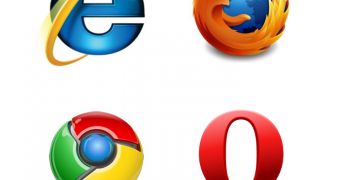It’s the same old browser-eat-browser world, but the pace at which the main market players are unveiling new moves has changed considerably, compared to just a few years ago. The continuously accelerating browser race hasn’t left anyone without breath yet, with Microsoft, Google, Mozilla and Opera stepping up their game to keep up with each other. But there’s little doubt over the fact that the game itself has changed to suit a new, instant gratification-focused world.
Mobility. It automatically implies additional characteristics, as adaptability; high speed for the introduction of innovation; and modern browsers to take the experiences on the world wide web further. Not only are interim testing releases, nightly builds and development milestones succeeding one another at a fast pace, but pressure is on browser makers to catalyze the evolution of their respective applications as fast as possible.
Immobility. Not the perception that customers should get from any of the top browser vendors worldwide, not that any of them would afford it. In the past, Microsoft has seen its fair share of criticism for holding the web back, in part also because of the IE6 to IE7 gap. But after unveiling the pre-release versions of IE9, it is clear that the Redmond company has changed the strategy for building IE, falling in line with rivals.
Chrome 6.0
I think it’s safe to say that the introduction of another player on the browser market has brought new, healthy and welcomed competition. Synonymous with Internet search, Google unveiled its own open source web browser, dubbed Chrome, less than two years ago, in September 2008. In the past couple of years, the Mountain View-based search giant has delivered major version after major version, relentlessly. Google Chrome 6.0 is currently under development, and if the company keeps up the pace, v.10.0 will be here in no time at all.
Google has already been hard at work on version 6.0 of Chrome since May 2010, and even earlier, considering the efforts put into the Chromium open source project that is at the foundation of Chrome. Offered for testing through the Dev channel, Chrome 6.0 will follow the same path to general availability as previous releases before it. In this regard, it will graduate to the Beta channel, before being moved to the Stable channel and offered to end users worldwide, most probably in the next few months, by which time, Google would have already started looking ahead to Chrome 7.0.
Opera 10.70
At the start of July 2010, Opera Software wrapped up and made available for download Opera 10.60. With support for Geolocation, Web Workers and Offline Applications, a new version of the Presto rendering engine, an optimized JavaScript engine and a touched-up UI, Opera 10.60 was offered just a few months after version 10.50.
Opera 10.50’s time in the spotlight was short lived, since it was only released in March, to have a replacement in place just four months later. Still, the Norwegian browser maker has already shifted its focus on the next version of Opera, with the first development snapshots of Opera 10.70 already available for testing by early adopters.
Firefox 4.0
Mozilla is working to deliver the next major iteration of Firefox in less than 1 year after its predecessor. Or at least this is the current plan, and users should be advised, plans can change. The delivery deadline for Firefox 4.0 has been set for the last quarter of 2010, and the first Beta development milestone of the browser version is already available for download. Whether Mozilla will be able to pull off another major release of its open source this year or not remains to be seen.
Firefox 3.6 was finalized in the second half of January 2010, at which point in time, Mozilla started to plan its successor. The first Beta Build of Firefox 4.0 became available for download per the timetable set by the browser vendor, and additional testing releases are soon to follow. Early adopters already familiar with Mozilla’s open source approach to development already know that they will get to access, download and test drive a plethora of releases, since Mozilla is sharing nightly builds on a constant basis for all its projects, not just Firefox.
Internet Explorer 9
As of March 2010, Microsoft is opening more of its Internet Explorer development process to early adopters. With the IE9 developer previews, the Redmond company is reaching out to web devs, allowing them to familiarize themselves with the brand new Internet Explorer. And brand new is by no means a hyperbole. IE9 is more like Firefox, Chrome and Opera than like IE8.
Microsoft paced the release of new Platform Preview Builds of IE9 once every 8 weeks, and so far it managed to overdeliver, by beating its own estimated deadlines with the availability of PP2 and PP3. At this point in time, the next pre-release version of IE9 is cooking. The software giant is rumored to take IE9 to Beta stage in the coming months, but there no official confirmation from the company in this regard.
IE9 Beta will be offered when the browser reaches a certain level of quality recommending it for such as release. But at this point in time, milestones such as Beta, Release Candidate (RC) and RTM are still “to be announced.”
Internet Explorer 9 (IE9) Platform Preview is available for download here.
Firefox 4.0 is available for download here.
Chrome 6.0 is available for download here.
Opera 10.70 is available for download here.
Follow me on Twitter @MariusOiaga.

 14 DAY TRIAL //
14 DAY TRIAL //